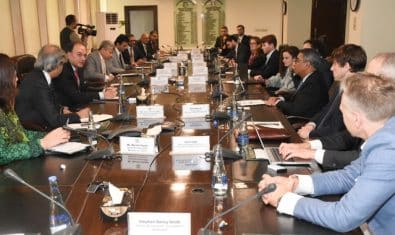Underlying Pakistan’s growth and productivity performance are political economy and governance challenges that hinder sound policymaking and implementation, says World Bank.
The Bank in its latest report “From Swimming in Sand to High and Sustainable Growth A roadmap to reduce distortions in the allocation of resources and talent in the Pakistani economy” noted that Pakistan’s growth is stunted by its inability to allocate all of its talent and resources to the most productive uses. Underlying that inability are various distortions, either introduced by policy decisions, or unaddressed by them.
The distortions in place in Pakistan are to a large extent the result of powerful ‘insiders’, albeit limited in number, who influence the policy-making process to maximize their own benefits. In agriculture, these are large landowners that benefit from subsidy schemes or underpriced inputs for a narrow set of crops (e.g.: sugar or wheat). In domestic-oriented manufacturing, these are large businesses that secure import protection, often at effective rates above 100 percent.
Export-oriented manufacturing
In export-oriented manufacturing, these are large exporters of well-established products, such as textiles and apparel that receive a disproportionate share of export subsidies, including Drawback of Local Taxes and Levies (DLTL),
Export Finance Scheme (EFS) and Long-Term Financing Facility (LTFF), and in some cases also subsidized energy. In services, these are financial institutions that finance large portions of relatively low-risk government debt, or real estate-related sectors that face a reduced tax burden relative to other sectors of the economy.
Distortions are often at the expense of a larger group of outsiders, and fundamentally, at the expense of fast and sustained growth. ‘Outsiders’, in this context can be largely denied as those not benefiting from preferential conditions that these distortions introduce for the insiders.
These are, for example, consumers that pay higher prices due to high import protection, subsistence agriculture farmers that do not benefit from high procurement prices or subsidies on output or inputs, and micro or small enterprises that are de facto excluded from subsidy schemes or tax exemptions because of the complexity of the schemes (e.g. the Duty and Tax Remission for Exporters, DTRE), those enterprises (existing or potential ones) that are de jure excluded because they export non-traditional products (e.g. in the cases of DDT and DLTL that mainly focus on traditional export products), or females that face disproportionate costs to participate, inter alia, in the labor force.
These insider-outsider dynamics make reforms to level the playing field extremely challenging, requiring both strong political leadership and civil society. A three-step approach is proposed, that starts with reforms to level the playing field through the removal or reduction of distortions, followed by interventions to support growth in the context of a more level playing field. Finally, to ensure the sustainability of these changes, there is a need for increased evidence-based policy-making and greater transparency, so that civil society has the elements needed to demand efficiency-enhancing reforms.
Distortions can take many forms including taxes, subsidies, size-dependent industrial policies, trade restrictions, or gender norms. Taken altogether, these distortions create powerful incentives for firms and households to allocate resources in ways that are socially suboptimal, while also discouraging innovation and productivity upgrading.
In Pakistan, a 10 percent import duty on a given product increases profits of selling domestically relative to exporting by 40 percent on average. Firms that decide to embark upon export-oriented manufacturing despite these adverse incentives face a further distortion: if they want to innovate, they miss out on export subsidies.
It is 80 percent more likely for a potential exporter that decides to export a traditional product (e.g., apparel) to be eligible for an export subsidy, than for one that decides to innovate and export a new product.
This is because export subsidy schemes target mostly well-established, unsophisticated export products and can provide up to a 30 to 35 percent boost in profits. In agriculture, for example, subsidies and support prices for specific crops coupled with additional subsidies on key inputs (e.g., water) induce farmers to allocate land to sugarcane rather than diversifying into other crops that would fetch better prices internationally, or that embed less water.
Untapped FDI potential
To increase investment rates and bring in large firms that could add dynamism to markets, the country could leverage its untapped FDI potential – estimated at $2.8 billion annually. Tapping that potential would lead to more than doubling current inflow levels.
This estimated untapped potential FDI does not imply a ceiling but rather what would be expected given Pakistan’s characteristics, average policies, and implementation capacity. However, attracting export-oriented, or efficiency-enhancing FDI will require active policies to reduce trade costs, streamline the regulatory environment, and reduce policy uncertainty. Currently, the type of FDI in Pakistan is mostly inward-oriented, with limited productivity spillovers to the rest of the economy.
The World Bank has recommended removing distortions to improve aggregate productivity through a better allocation of resources, by focusing on:
Tax policy: Widen the tax net, harmonizing tax rates across sectors, to ensure a level-playing field and facilitate the reallocation of resources from non-productive non-tradable (e.g. real estate) and into more productive sectors (tradable or efficiency-enhancing non-tradable).
Trade policy: Gradually reduce the anti-export bias of trade policy by reducing import duties, to facilitate the reallocation of resources, from domestic to outward-oriented activities.
Export schemes: Expand eligibility of export subsidies to favor export growth and diversification.
Size-dependent policies: Re-consider size-dependent industrial policies, to reduce incentives for firms to stay small de jure or de facto.
Agriculture subsidies: Gradually phase out subsidies and price support in the agriculture sector, to facilitate a market-based allocation of land, labor, and equipment based on comparative advantage, and re-allocate the created fiscal space toward investment in climate-smart technologies and infrastructure for crops and livestock, and agriculture extension services and research.
Working conditions for women: Enact gender-unbiased hiring policies, enforce existing legislation on workplace harassment, and consider wage subsidies to boost female employment at intermediate skills levels, to improve the allocation of talent in Pakistan.
Female transport: Invest in safe, dedicated transport and improved soft connectivity to facilitate remote work, to boost female labor force participation and productivity more generally. Second, to ensure the maximum positive impact of the alleviation of distortions, consider the following complementary reforms.
Fiscal space: Crowd in, rather than crowd out private investment by increasing the tax base and the efficiency of spending (including SOE reform ranging from improved governance and management to privatization in areas in which firms are not viable and state involvement unrequired), to reduce the borrowing needs of the consolidated government thereby releasing resources for the private sector to borrow and grow.
The Bank has further recommended subjecting all interventions that entail the use of public funds to rigorous impact evaluations and creating a dynamic loop from evidence to policymaking. Engage academia to link to the public sector and make data on direct support to firms or individuals as transparent as possible.
It has also recommended mandating by law that all tax expenditure and subsidy proposals are properly costed before reaching the decision-making stage and making the results of the costing public.






















